The Peace Poets are now offering sessions to compose songs with you!
Do you have upcoming meetings, rallies, marches or actions?
Could we make them even more inspiring with the power of original music?
“These are most talented and inspiring young men with a mission to expose social problems through poetry and music. This episode includes several examples of their work. Do not miss this one and check out The Peace Poets.”
“[PWIIGF] is a BCR series focusing on the committed and reverberating poetry of our times — produced by Chris Brandt of Fordham University, English Dept. — and member of Witness Against Torture. For this PWIIGF episode, Chris invited two members of the inspiring NYC activist performance group The Peace Poets — a “family born of Hip Hop, heart, and hope in New York City.” In 2014 Peace Poets song “I Can’t Breathe” protesting the murder of Eric Garner by the NYPD went viral when actor, Samuel L. Jackson, recorded himself singing I Can’t Breathe.”
The Peace Poets’ hip-hop and poetry about the power of the people has led them to the front lines of social movements around the world.
Article by Loretta Graceffo for Waging Nonviolence
by A-B-E
This Saturday, January 19th 2019, The Peace Poets will be joining the Women’s Unity Rally in Foley Square 10am – 2pm with staff and members from The Brotherhood/ Sister Sol.
Women’s Unity Rally: https://actionnetwork.org/events/womens-march-in-new-york-city-official-chapter
The Peace Poets have composed a number of movement music chants to be used this weekend and shared widely for other protests, rallies, and actions in support of equity for women and women’s rights.
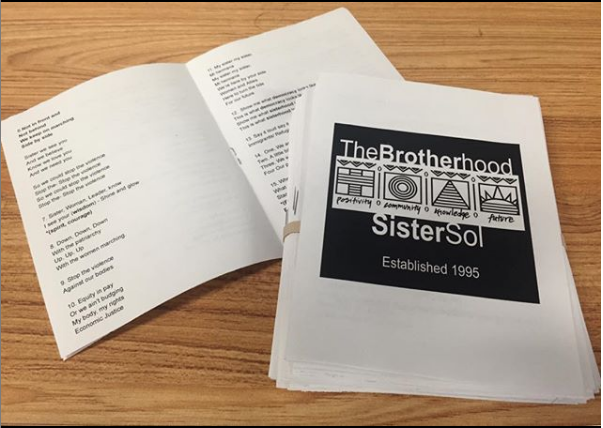
Thank you for joining us and singing and for sharing!
View this post on Instagram
My sister my sister,
Mi hermana
My sister my sister,
Mi hermana
We’re here by your side
Women and Allies
Here to turn the tide
For our future
View this post on Instagram
Equity in pay
Or we ain’t budging
My body, my rights
Economic Justice
View this post on Instagram
Stop the violence against our bodies
View this post on Instagram
Down, Down, Down
With the patriarchy
Up, Up, Up
With the women marching.
View this post on Instagram
Sister, Woman, Leader, know
I see your (wisdom) – Shine and glow
*(spirit, courage)
View this post on Instagram
Not in front and
Not behind
We keep on marching
Side by side
Sister we see you
And we believe
Know we love you
And we need you
So we could stop the violence
Stop the- Stop the violence
So we could stop the violence
Stop the- Stop the violence
View this post on Instagram
What we can do
Is help in rebuilding
Recognize our privilege
Leave it better for all children
View this post on Instagram
We’re breaking silence to stop the violence
View this post on Instagram
Justice now (Freedom, Equal Pay, Sisterhood)
We want justice now
Sisterhood
We see sisterhood now
View this post on Instagram
How can anyone know
(Healthcare Service is, Birth Control is, Sexual Education is)
What we’re needing
Our body, our rights
by A-B-E
I facilitated the second workshop of my Spoken Word Poetry residency with my young people in Queens yesterday. The residency serves a small group of high school teenagers, grades 10 – 12.
I was so excited to share with them an excerpt that I had read in Elizabeth Acevedo’s latest novel, “The Poet X.”
We read an excerpt from Part 1 of the novel, titled “After,” which described some of the protagonist’s experiences as a young Latinx teenager growing up and experiencing life in Harlem.
Part of Acevedo’s motivation in writing this novel was inspired by the 8th graders she’d taught in her career and the experience they frequently and collectively shared of not seeing themselves, their neighborhoods, or their experiences reflected in the literature they had been exposed to.
I was happy to see that my students, although representing Queens for life, were able to show to love to Harlem and were immediately immersed in Xiomara’s story, seeing themselves in her shoes.
*****SPOILER ALERT*****
If you have not read the “The Poet X,” by Elizabeth Acevedo, please continue reading at your own risk and take the opportunity to buy your copy and support Pan-African/ Latinx authors, artists, and the stories that are so often ignored and silenced.
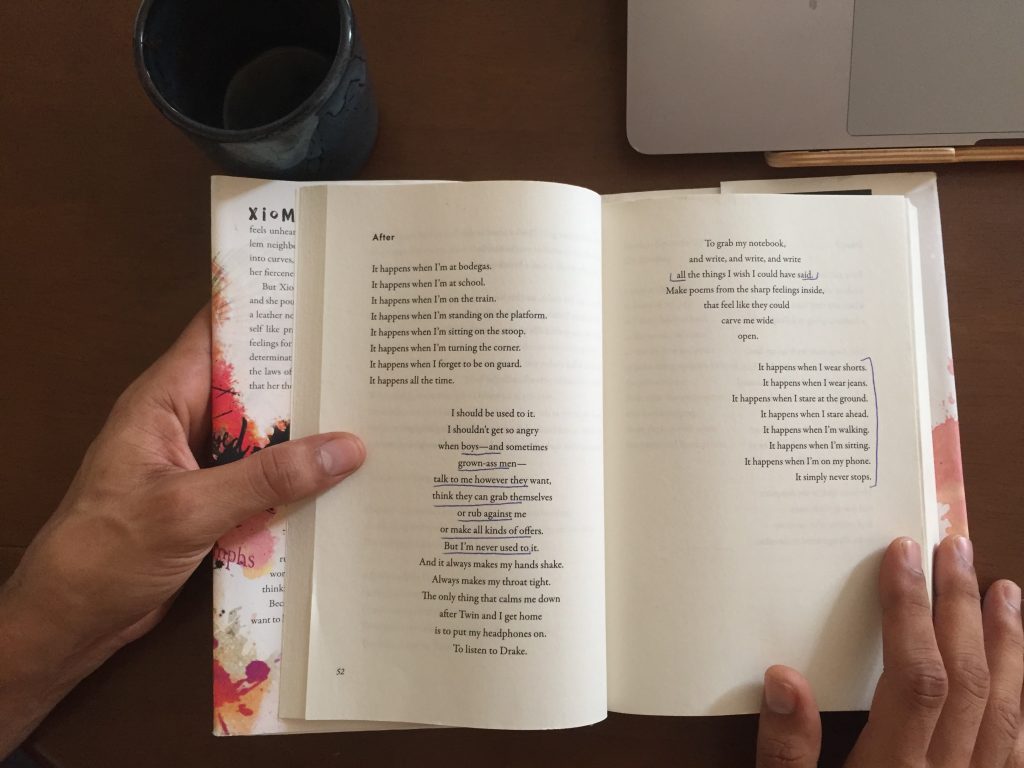
Part of the excerpt, “After,” is a reflection from the protagonist, Xiomara, and her experiences of the violence perpetrated by our patriarchal society and sexist culture.
While I was sure that the young people in class would be able to relate to the story of Xiomara, I was more shocked than I anticipated to hear the young people’s reflection of the text and of their personal experiences and interactions with men in their lives.
Youth ages 14 – 17 shared experiences about men and elders’ unwarranted attempts at flirting with them, calling them out of their names, and at times whispering or yelling at them to provoke some kind of attention.
Some men would exclaim to their friends how the girls that they tried to flirt with were clearly underage, and would continue in the pursuit of engaging the young women in conversation. Others would follow them with their eyes, with comments, and often follow them down several streets.
In enclosed spaces like elevators, construction workers, co-workers or internship partners, would attempt to maintain an eerie sense of sociability that after a few days transitioned from unwarranted comments and conversations to being physically touched and grabbed non-consensually.
The young people shared that there were moments where they were supported and helped by allies, co-workers and at times parents. Their fear and concerns, however, grew larger in the moments where they were alone and without anyone to help them during these recurring situations. Many felt that just to speak out, call out the person, or resist against their aggressors or attackers, while alone, would have put them in unsafe, precarious, and dangerous situations where they would have been unable to defend themselves.
It was my intention for the young people to read a text that they could connect to, that was written in “their” voice, and that was relevant to them. However, I was not aware when I brought the prompt into class that I would feel so overwhelmed and shocked with the multitude of stories that these youth shared and wrote about regarding their experiences as young women facing these violences in their city, schools, and homes. I did not want to believe what I already knew so well, that at the ages of 13 – 14, my young women already had a slew of violent experiences and traumas that would continue to shape them as part of our culture and day-to-day routines. These same norms would also continue to guide the young men in our society and develop their rites of passage into a twisted manhood that simultaneously strips them of their humanity and gives them a power that celebrates the oppression of women, and the destruction of themselves.
These experiences are nothing new. Perhaps I was more shocked with my naive hope that the realities I grew up witnessing had become better for this generation. The reality is that I am still uncovering and unlearning the ways I have been taught to participate in a social morality that promotes power through trans and queer-phobia, misogyny, and sexism. As a heteronormative, cisgendered, light-skinned, english-speaking, United States born, university educated, and privileged man, I am not even slightly aware of the daily, life-long, constant and consistent terrorizing that women face and that we as men contribute to through our actions, conversation, humor, and our inadequacy to address these multilayered and complex issues within other groups of men including our friends, loved ones, co-workers, or strangers.
While I do not pretend to have the magical answer, I know that the solution begins with opening the conversation and exposing ourselves to the truths and lived realities of those impacted by what we have been taught to celebrate and glorify in our society. Oppression is something that we all inherently participate in, and the questions I would like to address are are not who is responsible or who can we fault, but how do we personally contribute to the issue and what are the personal choices we can make to unlearn and heal from the same patriarchy that has made us all victims to losing our humanity.
I was blessed as a young person to have met Elizabeth Acevedo when she was 14 years old at The Brotherhood/ Sister Sol in Harlem, NY. Elizabeth along with Frantz Jerome, a fellow member of The Peace Poets, invited me to join the space and the writing program they called The Lyrical Circle.
For years this was one of the few, if not the only safe haven that I had as a teenager, as I reminisce trooping from The South Bronx towards 96th street and heading uptown into Harlem. It was a space for me to explore and understand myself better and the world around me. It was a gift to hear Elizabeth’s poetry, rap, and music in those days, and have a better understanding of how she was impacted by our twisted ideas of manhood and how I had contributed.
My love for my sister brought a magnifying lens to my eyes that not only made me more aware, but made me want to strive to explore what I could do to make the world a more equitable, just, and compassionate place for all the women in my life.
Thank you Elizabeth, and thank you to all the women in my life who have helped me to be a bit more in touch with my own humanity– although a lifelong journey awaits me in unlearning the violences I have learned and that continue to attempt to shift me into the comforts of my privilege and power.
For educators and cultural workers interested in using this text as an entry point for youth to engage in conversation and continue exploring their lived experiences, I would like to offer the following prompts which I used to in class, based off of Acevedo’s text, to begin a 10 minute writing exercise that could be used to further the conversation:
It happens when… (3 mins)
It makes me feel like… (3 mins)
I wish I could have said… (3 mins)
Review and last thoughts (1 min)
by A-B-E
August 2rd – 5th, 2018, The Peace Poets performed at the Arise Music Festival at the Sunrise Ranch in Loveland, Colorado.
10,000+ folks were present for the gathering on the sacred ancestral grounds of the Ute People.
Part of the intention f0r the Arise Music Festival was to ground ourselves in the idea that as our collective consciousness continues to awaken, we arise!
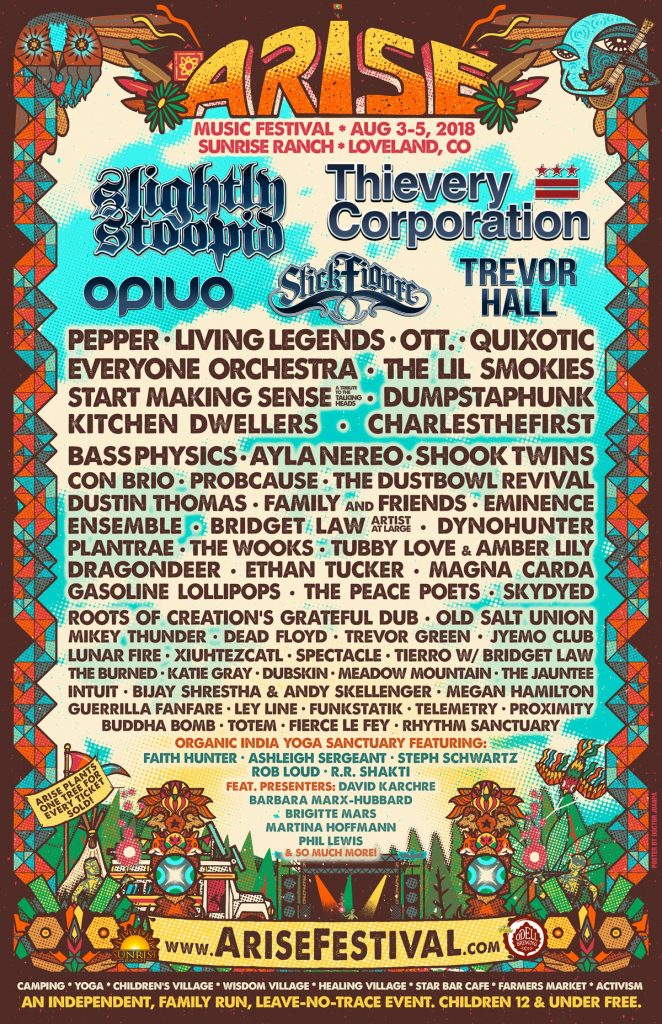
This independent, family-run festival attempts to leave no trace of the event behind to respect, honor, and care for the land in a more accountable way. Arise did not have any plastic bottles for sale, plenty of refillable potable water stations, and recycling bins throughout the grounds. The festival also plants a tree for every ticket sold.
Families were encouraged to attend by providing free entry for all young people under 12 years of age, and hosted an activities-filled Rainbow Lightning Children’s Village boasting a performance stage, face and body paint, costumes including butterfly wings, children-sized spin balls and all kinds of entertainment!
Passerby’s commented that the Children’s Village had to be a dream for parents who wanted to enjoy the festival, knowing they could bring their children and expose them to so many enriching activities, music, art, and nature!
On Saturday, Aug 4th, The Peace Poets opened their performance with call and responses to gather the energy and powerful voices of the people. The drumming of BombaYo’s Doctor Drum called upon the ancestral rhythms of resistance and love, and called everyone present to get into their bodies and onto the dance floor.
The Peace Poets wove a narrative through rap music and Spoken Word poetry about their most recent journeys resisting the separation of families at the border in San Diego, Ca. with MiJente, fighting to protect the land and water, and organizing for healing and community empowerment.
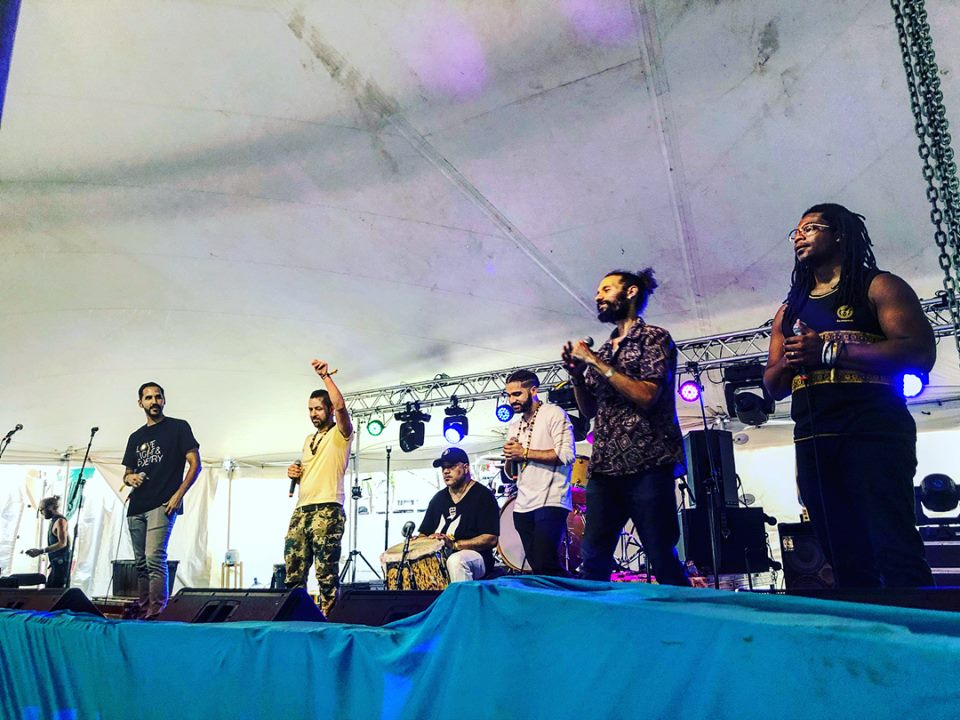
The Peace Poets celebrated in the spirit of the griots and beatboxed to accompany the foundation laid by Dr. Drum, and spoke out on topics including gentrification, police brutality, and our constant struggle for collective liberation.
The Peace Poets had the honor of having Xiuhtezcatl join them on stage and drop a verse for their Movement Music song, Shaking Ground.
Later that evening, The Peace Poets, La Marea and Living Legends, joined emcee and graphic novelist of The Burning Metronome, R. Alan Brooks, for the Hip-Hop: Words That Matter panel.
R. Alan Brooks emceed the conversation, as panelist deconstructed the importance and role of art in their lives, as tools for transformation, resistance, and speaking truth to power.
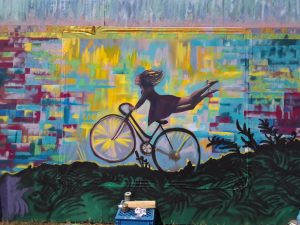
La Marea who wore a luchador mask, spoke on the patriarcal relationship of power that exists between the hyper invisibilization and underrepresentation of women of color and the violences that systematically continues to exploit and oppress indigenous women, black and brown women, queer women, and trans women.
The Last Emcee shared some thoughts below, and shortly after an incredible cypher ensued with verses, freestyles, and beatboxing from R. Alan Brooks, The Last Emcee, La Marea, and Living Legends.
The cleansing, and healing rains from a few beautiful and short thunderstorms graced us and called for some workshops to be canceled for safety concerns. The Peace Poets were not able to share their workshop, Harmonizing Organizing, designed for participants to tap into the power of song writing and music making for social justice and liberation.
Sunday, Aug 5th, The Peace Poets facilitated The Connectors, a Spoken Word poetry workshop focused on seeing each other and our struggle, hearing the land, and envisioning the world that we want our future generations to rise to.
Before heading out to Denver, Co. to meet with our Flobots family, the last act we caught was by La Marea.

La Marea created a beautiful ceremony bumping high-energy Hip Hop to truth telling lyricism over beautiful harmonies and flows that had everybody in the Star Water Stage dancing and singing! Check her below:
We can’t wait to rock again with you at ARISE 2019!
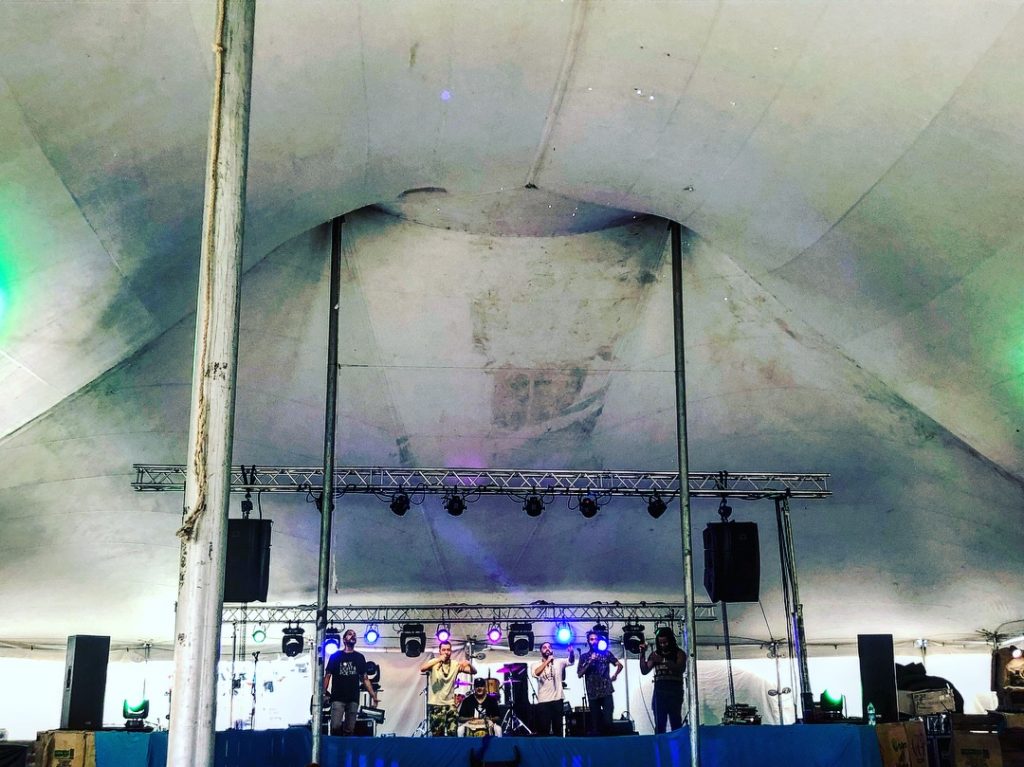
by A-B-E of The Peace Poets
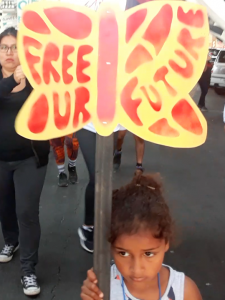 The children led us as we sang and marched from Chicano Park towards Downtown, San Diego, CA., demanding the US government abolish the Bureau of Immigration and Customs Enforcement (I.C.E.) established by President George H. Bush in 2003, to stop Operation Streamline from being established and launched in San Diego, and build towards a world without borders where no human being can ever be considered illegal.
The children led us as we sang and marched from Chicano Park towards Downtown, San Diego, CA., demanding the US government abolish the Bureau of Immigration and Customs Enforcement (I.C.E.) established by President George H. Bush in 2003, to stop Operation Streamline from being established and launched in San Diego, and build towards a world without borders where no human being can ever be considered illegal.
U.S. Attorney General, Jeff Sessions, has enforced a zero-tolerance policy for migrants and asylum seekers. The policy has resulted in the detention of thousands of migrants. Since the children of these migrants cannot be federally processed, the Trump Administration has separated these children from their parents and detained them thousands of miles away in centers spread about the country. A child 1 (one) year of age has already been asked to make a court appearance.
As we marched into the Downtown San Diego area to protest the separation of families and violence propagated by the border, hundreds of people in the streets were in awe as they turned their heads towards the top of the Westin Hotel. Two brave protectors scaled down the top of the hotel where they courageously dropped a banner that was 3-stories high and delivered the message, Free Our Families Now! #StopStreamline.

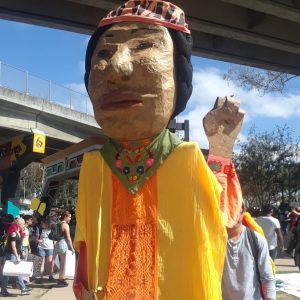
People gathered from all over the country and abroad to resist U.S. Attorney Adam Braverman’s recommendation and insistence on replicating Operation Streamline in the San Diego federal court system Monday, July 9th. Operation Streamline has been used in Austin, Texas and Tucson, Arizona throughout the past decade and has proved to be expensive, inefficient, and lucrative for the prison industrial complex, drug cartels, and sex rings who profit off deportees by means of exploitation, extortion, and violence.
Beside the violent abuses endured throughout processing and inside jails and detention centers, people who are legitimately in danger for their lives and seeking asylum for their children and themselves are not allowed the opportunity of due process nor just legal representation. People who are detained are lined up, up to 70 people at a time, and simultaneously processed and typically coerced into accepting guilty pleas for reduced sentences.
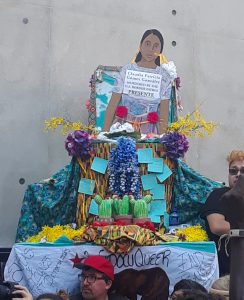
Many participated in non-violent civil-disobedience and blocked a Federal building with signs reading Shut Down Sessions! 10 people were arrested and have been criminally charged with felony burglaries, trespassing, and obstruction of justice.
Throughout our time in San Diego, Mi Jente reminded us all that we were all called to “fill in the gap” because everyone’s presence, capacity, and unique contribution is necessary. Mi Jente’s principles are founded on being pro-black, pro-woman, pro-queer, and pro-organizer. They coordinated us all in helping sweep, fold chairs, create art, carry puppets, lead ceremony, translate speeches, teach chants to sing in the streets, and risk arrest. This inner practice during our gatherings was an empowering affirmation of creating the world we know we deserve and want to live in. Thank you to Black Lives Matter San Diego, Jews for Racial and Economic Justice, Veterans for Peace, and everyone else who joined and supported us with so much courage, love, leadership and action!
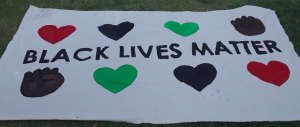
Participants will study liberation artists and explore varying perspectives on gender and sexism, racism, and issues of social relevance that are of interest to them. Participants will share interpretations and reflections, and translate them into fresh rhymes!
This series is an invitation into a journey of self reflection. We will study the self, and share the parts of us that ache. We seek to speak to the places of vulnerability and the social violences that we are all affected by. It is a space to laugh, cry, dance, release emotions, and know you are not alone. It is a call to recognize our individuality, our greatness, and the power of the collective. It is a call into leadership. The workshop is not merely designed to develop literal capacity, but to develop our emotional intelligence and create a class driven culture that values holding a safe space where everyone feels valued and welcomed, and no one is excluded. It is a place where we can be who we are and celebrate who we are becoming.
Dates: July 16 – 27, Tuesday – Friday.
Time: 10:30am – 12:30pm.
Ages: 13 – 17.
Participants: 8 (10 maximum).
Break: Light refreshments and snacks will be provided.
Registration: $110.
Registration: http://bit.ly/RSVPpeacecamp
Location and transportation:
Workshops will be facilitated at the Dan Berrigan Center in the Benincasa Community:
Benincasa Community
133 West 70th Street
New York, NY 10023
???? Trains: 1, 2, 3, B, C Trains to 72th Street
Benincasa Community is a lay community named for Catherine (Benincasa) di Sienna, the theologian, mystic, reformer, and peacemaker. Dedicated to the works of mercy and justice in an era thirsting for humanity’s collective recognition of unity and interdependence with all creation, Benincasa is grounded by faith, an emerging understanding of the new cosmology, the development of new economic models in our world, and the need for deepening relationships with the land and one another.
Facilitated by: Abraham Velazquez, Jr., A-B-E. Abraham completed his Master of Arts Degree in Educational Theatre at NYU, while studying Theatre of the Oppressed with Julian Boal in New York City, Barbara Santos in Berlin, Germany, and Sanjoy Ganguly in Badu and Kolkata, India. Abraham has facilitated his Rapademics and Instruments of Peace curricula with youth throughout The Bay Area, California and NYC.
Abraham has trained educators and organizers nationally and abroad at Universidad Internacional Menéndez Pelayo (Santander, Spain), La Casa Encendida (Madrid, Spain), The Cross Border Project in (Valladolid, Spain), El Simposio de Hip Hop Cubano (Havana, Cuba), American Space Madrid (Madrid, Spain) and Künstlerhaus Bethanien (Berlin, Germany) on how to engage communities in social justice and personal transformation through drama, poetry, and Hip Hop.
As a member of The Peace Poets, Abraham has organized youth conferences with The W.K. Kellogg Foundation, The American Civil Liberties Union of Mississippi, and National Youth Event (ACLU).
In 2007, Abraham toured his one-person production, Born Again! The Life of Richard F. Nicks throughout New York City, and authored the chapbooks Libra Libre and Thoughts From a Prophet. In November 2015, Abraham released his first solo album, A South Bronx Tale LP, which was engineered by Grammy Award recipient, Mikaelin “Blue” Bluespruce.
Arriving:
▶We ask that participants arrive 15 minutes early to participate in our gathering ritual before we enter the space together. Parents will be asked to submit permission slips that allow visits one block and a half blocks away from our Center to Central Park West for creative writing exercises.
by A-B-E of The Peace Poets
April 24 – 27th, 2018, I facilitated a professional development seminar, Hip Hop y Spoken Word Para La Intervención Social, at La Casa Encendida in Madrid, Spain. These spoken word poetry and Hip Hop culture workshops were designed for educators, organizers, and activists interested in creating art, building community, and activating creation into action for social justice.
We had spent our week sharing spoken word poems, learning how to beatbox and break, and studying the connection between Hip Hop and the Civil Rights movements, when on the 3rd day of our workshop many of us found ourselves very impacted by a the court decision given that day. The hearing regarded an event that occurred 2 years ago where an 18 year old teenager was assaulted and gang raped by 5 men who called themselves La Manada, (The Wolf Pack), in the Sanfermines festival in Pamplona, Spain.
The judge declared that the 5 men were guilty of sexual abuse but innocent of sexual violation and rape. Some of the reasoning for this ruling is founded on the court’s definition of rape which excuses it as a crime if the victim does not use physical force to resist her aggressors. The victim, who did not consent to being recorded by those who gang raped her, had her eyes closed in the 7 videos while her assailants recorded and violated her. The judges deduced from the footage that the victim emoted no signs of discomfort, aversion, or displeasure and that the recordings (and the sharing of it) from her attackers were not a violation of her privacy either.
It is important to note that although the court definition for rape necessitates physical resistance, there are countless cases of rapists murdering their victims for the precise reason of physically resisting them. Thousands of victims’ bodies still remain missing today. The apparently obvious contradiction of the court hearing is that if a woman does resist being violated, she might wind up being murdered, and if she does not physically resist being raped, out of fear for her life, then the courts do not recognize the violation as rape.
Si te resistes, te matan, si no pones resistencia para sobrevivir, dicen que fue consentido. Si no denuncias es que eres tonta por no hacerlo y si denuncias, te cuestionan y al final sigue siendo culpa tuya. Ese es el mensaje que nos mandan hoy con la resolución de #LaManada
— Jacqueline. (@jjpperez_) 26 de abril de 2018
The judgement is a dangerous declaration to men and all violators that raping or murdering a woman has little to no consequence. The 5 men making up part of the Wolf Pack have since served 2 years of their 9 year sentence which has currently been reduced to 5 years. These men might very likely be offered a reduction from the 3 years they have to serve to a 1 year sentence with good behavior and parole. This means that these men could possibly and will probably be free and back in society as soon as 2019. Some of these 5 men are also currently being tried for other cases of sexual abuse and violation that they are implicated in.
As some of the participants mentioned in the workshop, the true horror is not that this is an isolated incident of one young woman who was violated, rather that it is an act that occurs daily. In Spain, statistics show that there are at least 3 Spanish women who face rape daily. These violations often happen in partnerships and relationships as well, and are not reserved as random acts of violence from strangers alone.
Por si a alguien le quedan dudas sobre cómo va esto de la #justiciapatriarcal, me he tomado el tiempo de haceros un dibujito…
De nada.#LaManada #EstaEsNuestraManada #YoSiTeCreo pic.twitter.com/i7WM3s2h2T— Maria Sande (@mariasande) 26 de abril de 2018
That evening, some of the participants from the workshop left together to participate in a protest where thousands of women of all ages, races, sexual orientation, and credences gathered to express their indignation, their rage, and their need for urgent change. It was beautiful to see sisters accompanied by friends, partners, family members, and allies. It’s always beautiful to see the dynamic between a community grow from folks barely knew each other a couple of days prior, to new family supporting and uplifting each other. I was charged by the energy of these fierce women, sisters, and warriors and have taken that vibration to reflect on my own individual and collective contributions to our misogynistic, patriarchal, transphobic, and heteronormative society, and question what kind of brother I want to be in our society.
Winning the struggle against this system is not achieved through the expression of rage on one particular day. The reality of the everyday violence must be confronted and dismantled as we encounter ourselves in these daily interactions. These are the interactions that occur walking down the street, on the metro, in night clubs. The work consists of examining our conversations at work and in social gatherings, examining the thoughts and behaviors that we accept, tolerate, or ignore. The work consist of being critical of the apparently innocent media that we consume, planting its seeds of propaganda which bears fruit in our subconscious and lived realities. We must teach boys and men with a culture and an education that respects and values the lives of all sisters, and all the mothers and grandmothers who have literally given us life.
The last day of our workshop, we finished the cumulative process of taking pop songs and recreating and remixing them into versions that expressed our emotional and intellectual analysis. Participants discussed the subtle and direct ways in which the songs propagated the sexual violences practiced daily. They rewrote the choruses of the songs, added their own rap verses and poetry, scored their song with beatboxing, and added dance to accompany their message. We use the practice of creating in this way to make art which is relevant, has a direct message, and can be used proactively in the streets to accompany marches, protests, and social justice actions, and demand the change that we desire for all future generations. This is the work of saying, yes, we are and have been oppressed, but we are not victims; we have voice and strength, we have survived and we will continue fighting.
This is the work of love. The kind of love that believes that the child of every mother deserves to live dignified and have their humanity respected. It is the revolutionary love that Mamie Till Mobley had for her son Emmett Till. This is the love of Hip Hop in action, and I’m so proud to have connected with new family that has allowed me to continue further humanizing myself.